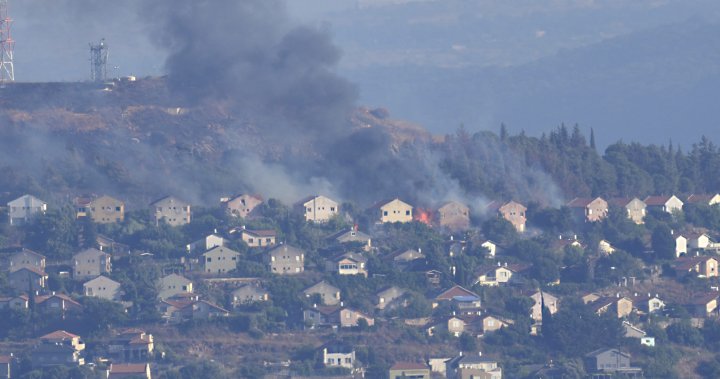The federal government is urging Canadians in Lebanon to get out of the country while they still can, warning the security situation is becoming “increasingly volatile and unpredictable” as violence escalates between Israel and the Lebanese militant group Hezbollah.
Foreign Affairs Minister Melanie Joly said Tuesday the situation could further deteriorate without warning, leaving Canadians unable to leave the Middle East country or access consular services.
“My message to Canadians has been clear since the beginning of the crisis in the Middle East: it is not the time to travel to Lebanon,” Joly said in a statement. “And for Canadians currently in Lebanon, it is time to leave, while commercial flights remain available.”
Joly said Canada is not currently offering assisted departures or evacuations from Lebanon, “and these are not guaranteed.”
Canadians in Lebanon should register with Global Affairs Canada and ensure their travel documents are up to date, she added.
Tuesday’s warning comes as the prospect of a full-scale war between Israel and Hezbollah has grown more acute.
This is a locator map for Lebanon with its capital, Beirut. (AP Photo).
The Iranian-backed Hezbollah began striking Israel almost immediately after Hamas’s Oct. 7 cross-border attack that triggered Israel’s military offensive in Gaza. Israel and Hezbollah have been exchanging fire nearly every day since then, but the fighting has escalated in recent weeks.
Breaking news from Canada and around the world
sent to your email, as it happens.
Hezbollah has more advanced military capabilities than Hamas, and opening a new front would raise the risk of a larger, region-wide war involving other Iranian proxies and perhaps Iran itself that could cause heavy damage and mass casualties on both sides of the border.
Hezbollah has said it will continue battling Israel until a ceasefire is reached in Gaza. The group’s leader, Hassan Nasrallah, warned Israel last week against launching a war, saying Hezbollah has new weapons and intelligence capabilities that could help it target more critical positions deeper inside Israel.
But Israeli Prime Minister Benjamin Netanyahu has said he won’t accept any deal that ends the Gaza conflict before Hamas is “eliminated,” jeopardizing a ceasefire proposal backed by the U.S. and the United Nations Security Council.

Netanyahu said Sunday in a lengthy TV interview with Israel’s Channel 14, a pro-Netanyahu TV channel, that Israel was winding down the current phase of fighting in Gaza, allowing more troops to reposition to the north to confront Hezbollah.
“We will have the possibility of transferring some of our forces north, and we will do that,” he said. “First and foremost, for defence,” he added, but also to allow tens of thousands of displaced Israelis to return home.
Netanyahu said he hoped a diplomatic solution to the crisis could be found but vowed to solve the problem “in a different way” if needed.
“We can fight on several fronts and we are prepared to do that,” he said.
White House envoy Amos Hochstein was in the region last week meeting with officials in Israel and Lebanon in an effort to lower tensions. But the fighting has continued.
U.S. Defense Secretary Lloyd Austin said Tuesday at the start of his meeting with Israeli Defense Minister Yoav Gallant at the Pentagon that the U.S. will continue to pursue a diplomatic solution to the hostilities, warning a war between Hezbollah and Israel would be catastrophic.
“Hezbollah’s provocations threaten to drag the Israeli and Lebanese people into a war that they do not want. Such a war would be a catastrophe for Lebanon and it would be devastating for innocent Israeli and Lebanese civilians,” Austin said.
“Diplomacy is by far the best way to prevent more escalation. So we’re urgently seeking a diplomatic agreement that restores lasting calm to Israel’s northern border and enables civilians to return safely to their homes on both sides of the Israel-Lebanon border.”
— with files from The Associated Press and Reuters
© 2024 Global News, a division of Corus Entertainment Inc.




